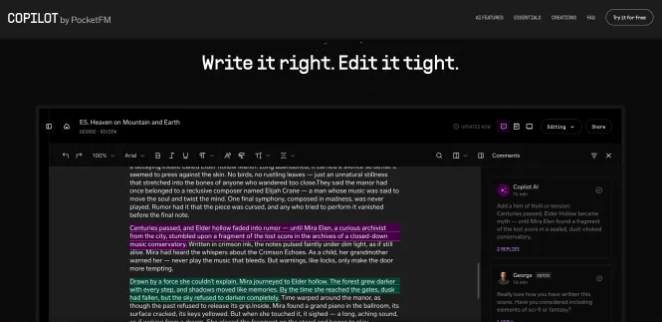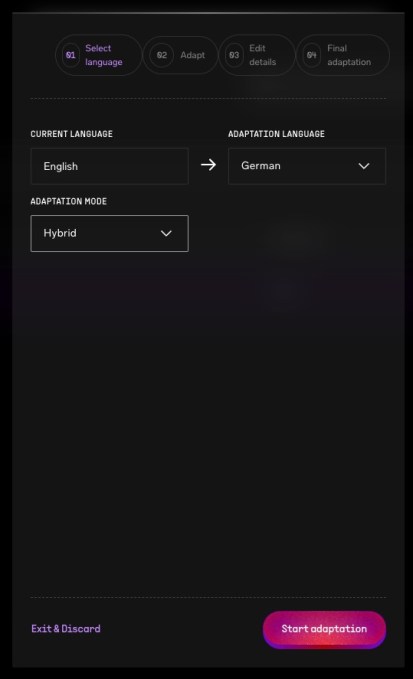Pocket FM, a producer of audio series platforms in India, is heavily investing in artificial intelligence technology, aiming to become the "Netflix of audio." This startup, backed by Lightspeed Venture Partners, recently launched an AI tool suite designed to help writers create content more quickly to meet the huge demand for hundreds of audio series.
Pocket FM's business model matches audio series content with user preferences, requiring the platform to publish large volumes of content quickly. To achieve this, the company developed a writing tool called CoPilot, which offers features such as suggesting better episode endings and making narratives more engaging for writers.

Founder Rohan Nayak stated that the company is promoting these AI tools to all writers to shorten the time it takes them to complete episodes. Previously, Pocket FM had already been using some AI tools, such as using ElevenLabs to generate voices for audio series, and internally testing AI tools for writing and adaptation assistance.
The functions of the CoPilot tool are quite comprehensive. It can convert narrative writing into dialogue writing and optimize specific segments. The tool also has a "beat analysis" feature that shapes writing styles according to the characteristics of specific types of audio series, making content more appealing. Additionally, CoPilot provides basic chatbot-like writing functions, including "shortening," "expanding," and generating text based on prompts.
To develop CoPilot, Pocket FM analyzed thousands of data points, deeply studying user engagement patterns in specific story plots. Based on these analyses, the tool added writing suggestion features specifically designed to increase conflict between characters and recommend more exciting endings for episodes. The AI can also suggest tags for background effects in the audio production process.

The tool can automatically generate character bios, relationships, and summaries of plot points for different episodes, allowing creators to refer to these details while writing. CoPilot also includes review tools that check plot points, grammar issues, and provide qualitative feedback through comments for episodes.
On the technical side, Pocket FM is training small models to maintain contextual consistency in stories, including character development trajectories and relationship settings, as well as narrative consistency. At the same time, the company uses user signals to guide the AI to add more dramatic elements into the stories.
International Expansion and Localization Strategy
With the launch of the AI tools, Pocket FM also released adaptation tools for various markets. These tools not only translate text from one language to another but also modify character names and phrases to suit the cultural context of the target region.
The company first introduced this tool in Germany earlier this year as part of the CoPilot suite, used to adapt stories from other regions. It was reported that the company faced difficulties in attracting users in European countries last year.
Nayak said the company saw excellent results from this trial, with monthly in-app revenue continuously growing and surpassing $700,000 in June. "When we start expanding to new regions, it usually takes 12-18 months to establish a meaningful presence in that market. You need at least 1,000 hours of content before you can start acquiring users and expanding your market size. Now we can do this in less than three months," Nayak said.

In the German market, the tool increased the productivity of writers by 50% in program output. Additionally, the tool helped the company produce fewer error-prone drafts, thereby improving user retention rates for audio series.
In the US market, series created using these new AI tools now contribute 10% of the playback time. These programs generated $7 million in revenue over the past 12 months, while reducing production costs by 2-3 times.
Expanding Content Generation Technology
By adopting different AI features, Pocket FM is able to rapidly scale up its content. The company states that it launches nearly 1,000 pilot episodes each month, and the sheer volume of content allows some of them to become popular.
However, audio programs are just part of the picture. The company is already developing tools to convert stories into comic strips for its Pocket Toons platform. Nayak also mentioned that video is a format the company may explore. This startup, which has raised over $196 million in funding, is also experimenting with short series apps.
Next year, Pocket FM plans to launch its own large language model (LLM), which will be based on data collected from its programs and integrate different tools such as writing assistance, adaptation, dramatization, and story context preservation. The company says that when switching to its own LLM, there is no need to train large numbers of small models for individual functions.
Potential Negative Impacts of AI Applications
The use of AI technology has also brought some side effects. Pocket FM has conducted multiple rounds of layoffs over the past 12 months, involving employees and contractors. Reports also indicate that writers' incomes have decreased over time. The company is facing lawsuits in California regarding employment and wage issues.
In response, a company representative said, "Like most content-driven industries, we work with a diverse network of writers, voice actors, and production partners on a project basis, adjusting resources according to each market. The impact of AI on our core creative community is minimal; instead, it opens up new avenues for expanding coverage and output."
Quality issues have also raised concerns. The company measures quality through program retention metrics. The basic idea is that even for independent creators, the new AI tools can act as a writer's room, enabling them to quickly produce more content. Based on data, writers can quickly edit stories with AI help. However, these tools may introduce "AI-generated low-quality content"—that is, low-quality AI-generated content—into the platform, potentially affecting user recommendations and making it difficult for users to discover good stories.
Pocket FM argues that stories with solid structures gain popularity, even with AI assistance. The company points out that every piece of content goes through its AI-driven review framework to ensure quality and originality. It also claims its AI review checks for repetition, copyright issues, content health, and other quality metrics before approving audio for release. Each program receives equal promotion, and user engagement ultimately determines the ranking of the program.
Another concern is that writers may become overly reliant on AI over time. In Germany, for certain specific programs, AI wrote more content than humans. As Pocket FM plans to launch more AI tools, the amount of AI-written content may increase. Along with that, the expectation to produce more episodes may also rise. Unless user adoption also increases rapidly, average returns may decline.
The company did not directly respond to inquiries about return issues, but said its AI tools can speed up the work of writers, helping them edit episodes based on data and audience feedback. That is, they can make targeted improvements rather than complete rewrites.
